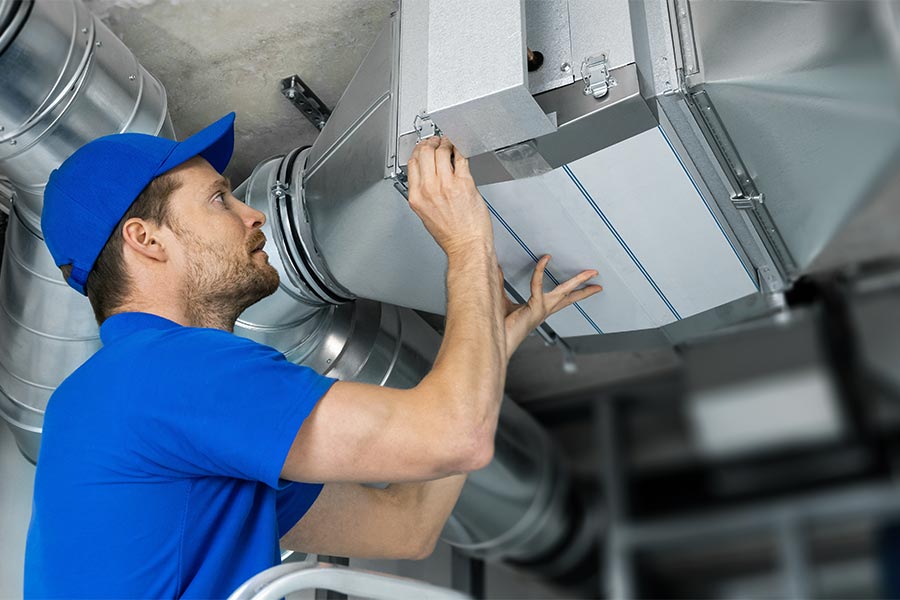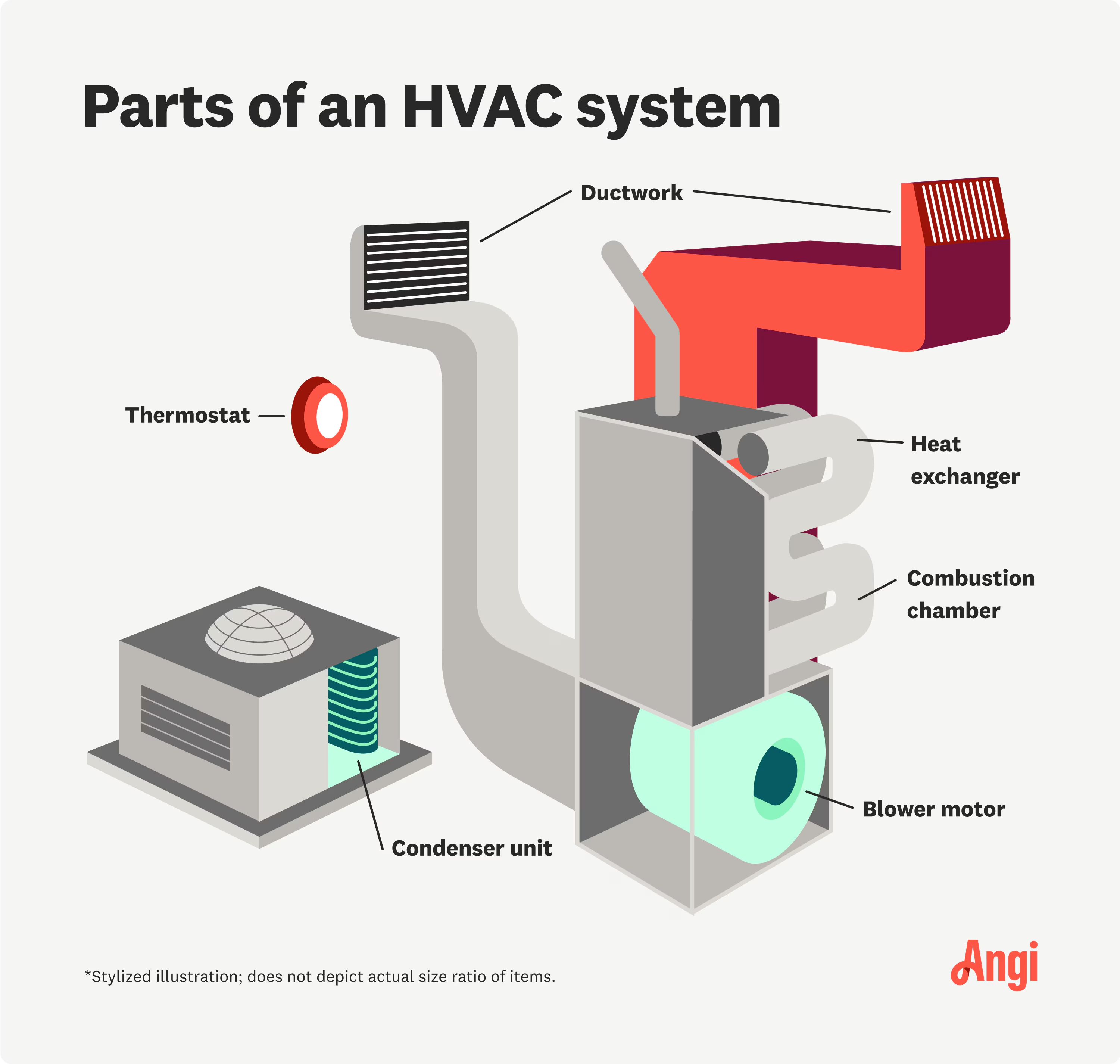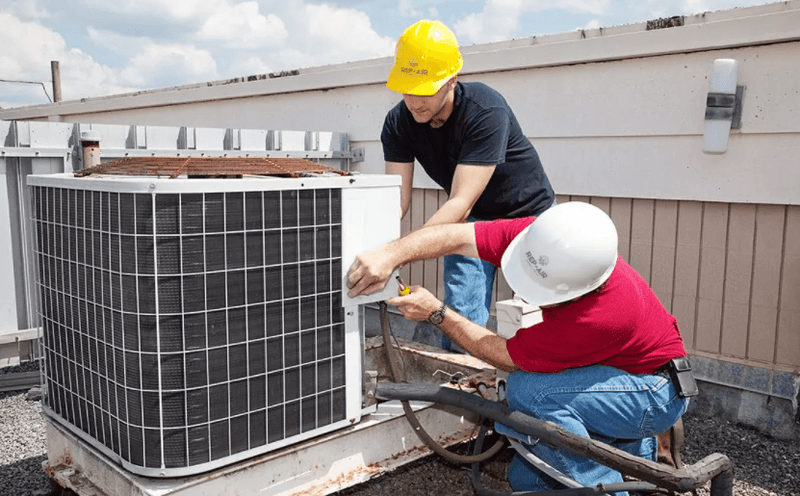Checking Out the Important Components of an Efficient Heating And Cooling System
An efficient HVAC system is built on a number of important elements that function in consistency. Each component, from the thermostat to the ductwork, plays a crucial function in preserving comfort and power effectiveness. Comprehending these aspects is crucial for enhancing efficiency and boosting interior air top quality. As one analyzes these parts, the elaborate partnerships between them disclose understandings right into enhancing general system performance. What particular factors add most to this performance?
The Duty of the Thermostat in Cooling And Heating Efficiency

Although often neglected, the thermostat plays a crucial duty in the efficiency of heating and cooling systems. HVAC experts. This little device functions as the main control facility, regulating temperature level setups and making sure suitable comfort within a room. By precisely sensing the ambient temperature level, the thermostat interacts with the air, air flow, and home heating conditioning devices to maintain the wanted environment
A reliable thermostat lessens energy intake by turning on the HVAC system only when needed, thereby stopping extreme home heating or cooling. Modern clever and programmable thermostats enhance this effectiveness additionally by permitting customers to establish schedules and from another location change settings, adjusting to everyday routines.
The placement of the thermostat is important; improper place can lead to unreliable temperature analyses, resulting in ineffective procedure. In general, a well-functioning thermostat not just enhances convenience but also contributes significantly to power cost savings and the durability of the HVAC system.
Comprehending the Value of Air Filters
Air filters offer a vital function in a/c systems by assuring that the air flowing within a room remains tidy and healthy and balanced. These filters catch dust, allergens, and other pollutants, stopping them from being recirculated throughout the setting. By recording these fragments, air filters add to boosted indoor air high quality, which can considerably profit owners' health, especially those with allergies or respiratory conditions.
Furthermore, keeping tidy air filters boosts the performance of a/c systems. Stopped up filters can restrict air flow, triggering the system to work tougher to keep preferred temperatures, causing raised power intake and greater energy bills. Routinely replacing or cleaning up filters is an essential maintenance action that can extend the life expectancy of cooling and heating equipment. Ultimately, understanding the significance of air filters enables property owners and structure managers to take positive steps to guarantee a well-functioning, reliable cooling and heating system that advertises a risk-free and comfortable indoor environment.

The Capability of the Furnace and Heatpump
Heating systems and heatpump are critical components of heating and cooling systems, in charge of providing warmth during colder months. Furnaces run by home heating air with combustion or electrical resistance, then dispersing it throughout the home using ducts. They usually provide fast heating and can be sustained by gas, power, or oil, relying on the system kind.
On the other hand, heatpump move warm as opposed to create it. They remove warm from the outside air or ground, also in reduced temperatures, and move it inside. HVAC experts. This dual performance allows heatpump to additionally offer cooling in warmer months, making them functional choices for year-round climate control
Both systems call for appropriate upkeep to ensure performance and long life. While heaters master extreme cold, heatpump can be useful in moderate environments. Understanding their unique functionalities help home owners in picking one of the most suitable choice for their home heating needs.
Discovering the Air Conditioning Device
The cooling system is a vital part of cooling and heating systems, readily available in different kinds to suit various demands. Understanding the effectiveness scores of these systems is important for making informed choices regarding power intake and expense. This area will check out the varied sorts of a/c and clear up just how effectiveness ratings influence efficiency.
Sorts Of Air Conditioners
While numerous variables affect the selection of cooling systems, understanding the various types readily available is vital for property owners and structure supervisors alike. Central air conditioners are developed to cool entire homes find out this here or buildings, using a network of ducts for airflow. Home window devices supply a more localized solution, perfect for tiny rooms or solitary areas. Mobile air conditioning unit offer adaptability, allowing customers to relocate the device as required. Ductless mini-split systems are an additional choice, integrating the performance of main systems with the comfort of zoning, as they need no ductwork. Ultimately, geothermal systems harness the planet's temperature level for energy-efficient air conditioning. Each type includes unique benefits, making notified choices essential for reliable climate control.

Efficiency Ratings Clarified
Understanding performance ratings is important for selecting the ideal a/c unit, as these metrics provide understanding into the system's efficiency and energy consumption. One of the most typical rating for a/c is the Seasonal Energy Efficiency Ratio (SEER), which determines the cooling output throughout a normal air conditioning season separated by the complete electrical energy input. A greater SEER suggests far better performance. In addition, the Power Performance Proportion (EER) is utilized for gauging efficiency under specific conditions. An additional essential metric is the Power Star certification, which symbolizes that an unit satisfies basics rigorous energy effectiveness standards. By assessing these rankings, consumers can make enlightened options that not only enhance comfort yet likewise reduce energy prices and ecological influence.
The Importance of Ductwork and Air flow
Reliable ductwork layout and airflow management play critical functions in the total efficiency and performance of a/c systems. Proper ductwork assurances that conditioned air is dispersed evenly throughout a space, decreasing temperature changes and improving convenience. Well-designed air ducts decrease resistance to airflow, lowering the workload on a/c tools and inevitably decreasing power intake.
Air movement management includes tactically positioning vents and signs up to enhance the flow of air. This avoids typical issues such as cool or hot places, which can occur when air flow is obstructed or inadequately well balanced. In addition, the appropriate air duct materials and insulation can further improve efficiency by lowering heat loss or gain throughout air transit.
An effective ductwork system not just adds to energy savings yet can also extend the lifespan of heating and cooling devices by minimizing unnecessary pressure (HVAC experts). Comprehending the relevance of ductwork and airflow is vital for accomplishing peak A/c system performance.
Regular Upkeep Practices to Enhance Performance
Regular upkeep methods are vital for guaranteeing peak efficiency of a/c systems. These practices consist of routine evaluations, cleansing, and needed repair work to keep the system running effectively. Consistently altering air filters is vital, as clogged up filters can block airflow and minimize efficiency. Furthermore, service technicians ought to check and tidy evaporator and condenser coils to avoid getting too hot and energy waste.
Annual expert assessments are also suggested, as experienced service technicians can determine possible issues prior to they escalate. Lubricating moving parts decreases wear and tear, adding to a much longer life-span for the system. Furthermore, ensuring that the thermostat functions appropriately aids in preserving optimal temperature control.

Regularly Asked Questions
Just how Commonly Should I Change My Thermostat?
Thermostats ought to commonly be changed every 5 to 10 years, depending upon use and innovation developments. Normal checks are a good idea to guarantee peak performance, particularly if experiencing irregular temperature control or enhanced energy costs.
What Dimension Air Filter Is Best for My A/c System?
The ideal dimension air filter for a heating and cooling system differs by unit style. Commonly, it's vital to consult the owner's manual or check the existing filter dimensions to guarantee peak efficiency and air high quality.
Can I Mount a Heatpump Myself?
Setting up a heatpump separately is possible for knowledgeable people, yet it calls for understanding of regional codes and electric systems. Working with a specialist is advised to assure appropriate setup and perfect system performance.
Just how Do I Know if My Ductwork Is Reliable?
To establish ductwork performance, one ought to inspect for leaks, step air movement at vents, evaluate insulation top quality, and evaluate temperature level distinctions between supply and return ducts. Professional analyses can give complete understandings into total efficiency.
What Are Indications My Cooling And Heating Needs Immediate Upkeep?
Indications that a cooling and heating system requires instant upkeep include unusual noises, irregular temperature levels, enhanced energy expenses, unpleasant smells, and regular biking. Resolving these concerns promptly can protect against additional damage and guarantee top system performance.
Air filters offer a crucial feature in Heating and cooling systems by ensuring that the air circulating within a room remains healthy and balanced and clean. Furthermore, maintaining tidy air filters enhances the effectiveness of A/c systems. Ductless mini-split systems are another choice, integrating the performance of central systems with the comfort of zoning, as they call for no ductwork. Understanding performance scores is important for picking the appropriate air conditioning my latest blog post device, as these metrics offer understanding into the system's efficiency and energy intake. The best dimension air filter for an A/c system differs by device design.